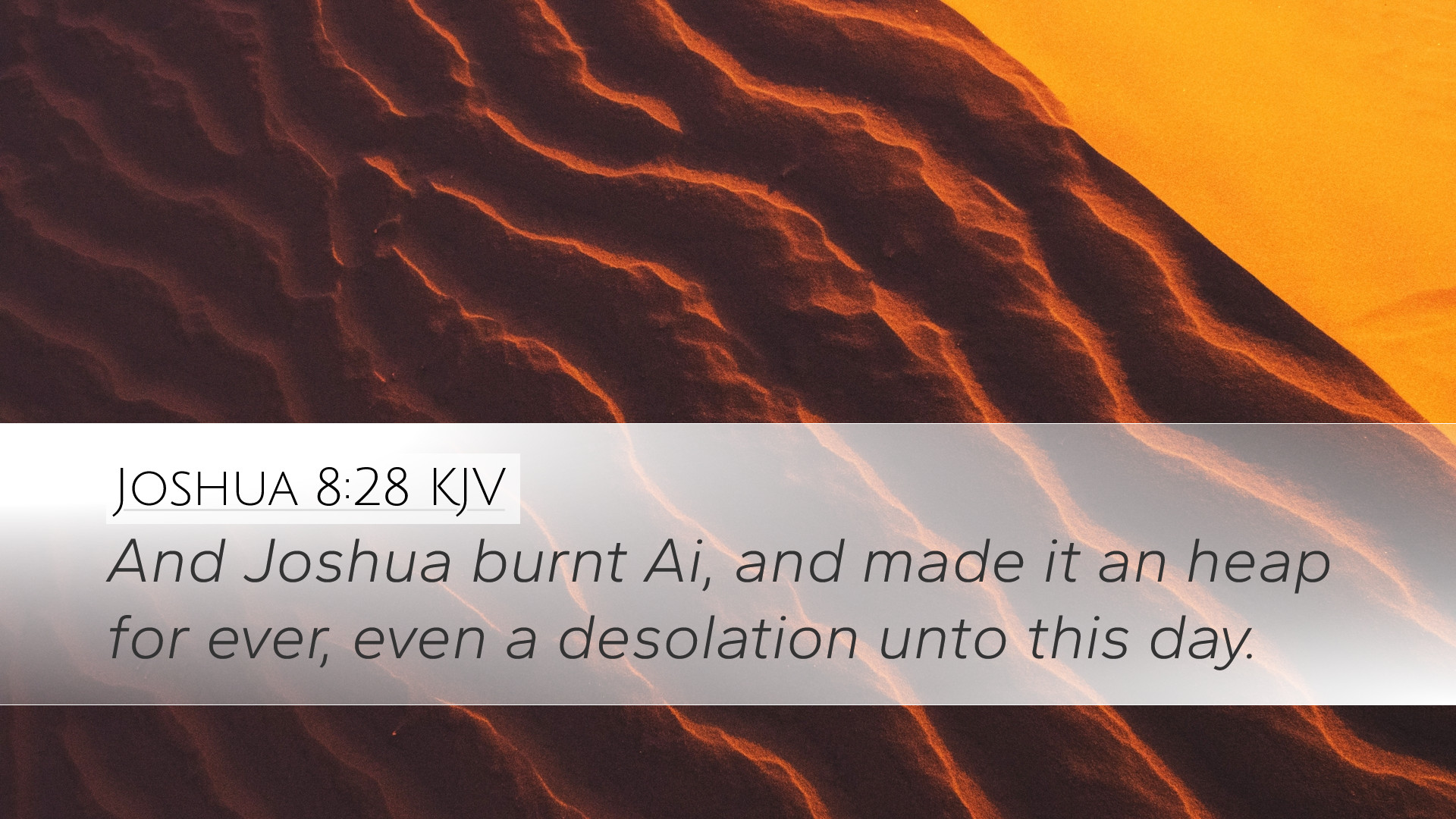Summary and Commentary on Joshua 8:28
Joshua 8:28 states: "So Joshua burnt Ai, and made it a heap for ever, even a desolation unto this day." This verse marks a pivotal moment in the history of Israel, demonstrating God's judgment against sin and His commitment to His covenant people. Various public domain commentaries offer profound insights into this passage that can benefit pastors, students, theologians, and Bible scholars.
Contextual Overview
The narrative surrounding Joshua 8 is centered on the Israelite conquest of Ai after their initial defeat. Following the guidance of God and the correction afforded by the sin of Achan, Joshua leads the people to victorious battle. The destruction of Ai serves as a testament to God’s power and the seriousness of rebellion against His commandments.
Insights from Matthew Henry
Matthew Henry affirms that the burning of Ai signifies not only a military victory, but also a divine message. He emphasizes:
- The Symbolism of Destruction: Henry posits that the heap of ruins becomes a permanent reminder of the folly of opposition to God’s will.
- Judgment and Mercy: The destruction of Ai serves as a warning to Israel and an example to future generations of the consequences of sin.
- God’s Promises Fulfilled: The event marks the fulfillment of God’s promise to give the land to His people, reinforcing their identity and purpose as a covenant community.
Insights from Albert Barnes
Albert Barnes focuses on the theological implications of the destruction of Ai, providing key reflections:
- Severity of Divine Judgments: Barnes notes that the complete destruction of Ai underlines the seriousness with which God deals with sin and rebellion. The totality of the destruction is indicative of divine wrath.
- The Historical Significance: He identifies this event as crucial for the establishment of the Israelite settlement in Canaan, contextualizing it within the broader narrative of conquest and settlement.
- The Importance of Obedience: Barnes reiterates that this victory follows the covenantal obedience that Joshua exhibited, thereby illustrating the principle that faithfulness leads to God’s favor.
Insights from Adam Clarke
Adam Clarke provides a detailed exegetical commentary on the verse, highlighting various elements:
- The Nature of the Destruction: Clarke elaborates on how burning Ai was not merely a military tactic but a means of total annihilation intended to ensure it would never rise again.
- Lessons for Israel: Clarke reflects on how the fate of Ai serves as a cautionary tale for Israel to remain vigilant against temptation and sin.
- Theological Reflections: He discusses the implications of this narrative for understanding God's justice and mercy, affirming that divine justice leads to a greater understanding of God's love for His people.
Thematic Reflections
From these insights, several themes emerge from Joshua 8:28 that hold significant relevance for contemporary readers:
- Divine Judgment: The complete destruction of Ai illustrates God's righteous judgment against sin. It emphasizes the depth of His holiness and the seriousness of His commandments.
- Historical Memory: The desolation of Ai serves as a historical memory for Israel, a reminder etched into their collective consciousness as they continue to navigate their covenantal relationship with God.
- Hope and Warning: While it acts as a stark warning against disobedience, the narrative also offers hope: redemption and restoration are always possible when Israel turns back to God.
Conclusion
Joshua 8:28 encapsulates a powerful moment in Israel's history that conveys multiple layers of meaning. Insights from Matthew Henry, Albert Barnes, and Adam Clarke invite deeper reflection on themes of obedience, divine judgment, and the nature of God's justice. As scholars and practitioners grapple with this text, it serves as both warning and encouragement: a call to faithful living in response to God's redemptive plan.


